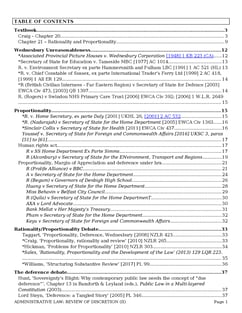Ridge v Baldwin [1964] AC 40
Judgement for the case Ridge v Baldwin
Table Of Contents
KEY POINTS
It is unlawful to dismiss an officer without initially informing them of the accusations and affording them the opportunity to present their defence or explanation.
Lord Hodson:
Persons acting in a capacity which is not on the face of it judicial but rather executive or administrative have been held by the courts to be subject to the principles of natural justice.
-
The three features of natural justice are the following:
the right to be heard by an unbiased tribunal
the right to have notice of charges of misconduct, and
the right to be heard in answer to those charges
FACTS
Mr. Ridge was the Chief Constable of Brighton and faced dismissal by the Watch Committee in March 1958. He argued that the dismissal was invalid because he had not been given notice of the grounds for his dismissal or an opportunity to defend himself.
Before this, he had legal issues, including an arrest and trial for conspiracy, resulting in suspension from duty. He was later indicted on a corruption charge and was acquitted. The Watch Committee dismissed him the day after his second acquittal.
The power of dismissal was governed by the Municipal Corporations Act, 1882, which allowed suspension or dismissal of a borough constable for negligence or unfitness.
Mr. Ridge contended that the Watch Committee should have followed regulations under the Police Act, 1919, for conditions of service, but the Respondents argued that these regulations didn't apply.
JUDGEMENT
Appeal allowed.
COMMENTARY
Ridge v. Baldwin is a landmark case that underscores the importance of natural justice in administrative and disciplinary actions, even in the context of public employment.
This case has had a lasting impact on administrative law and the protection of individuals' rights in similar situations.
ORIGINAL ANALYSIS
Defendant (the watch committee for the police) dismissed Claimant who had been acquitted at Crown Court on charges relating to conspiracy and corruption.
The trial judge intimated Claimant had not given professional and moral leadership to other officers.
HL held that the decision to dismiss Claimant was void because the watch committee had not observed the principles of natural justice. Claimant had not been charged nor informed of the grounds on which they proposed to proceed and had not been given a proper opportunity to present his defence.
Lord Morris
It is well established that the essential requirements of natural justice at least include that before someone is condemned he is to have an opportunity of defending himself, and in order that he may do so that he is to be made aware of the charges or allegations or suggestions which he has to meet.
For Further Study on Ridge v Baldwin
Need instant answers? Our AI exam tutor is here to help.
Ask questions 🙋 Get answers 📔 It's simple 👁️👄👁️
Our AI is educated by the highest scoring students across all subjects and schools. Join hundreds of your peers today.
Get StartedSimilar Cases
Related Product Samples
These product samples contain the same concepts we cover in this case.
| Administrative Law | Procedural Fairness Notes (24 pages) |
| Administrative Law | Procedural Fairness Reasons And Expectations Notes (31 pages) |

 Since 2010, Oxbridge Notes has been a trusted education marketplace, supplying high-quality materials from top achievers at universities like Oxford, Cambridge, LSE, Harvard, and Yale.
Since 2010, Oxbridge Notes has been a trusted education marketplace, supplying high-quality materials from top achievers at universities like Oxford, Cambridge, LSE, Harvard, and Yale.